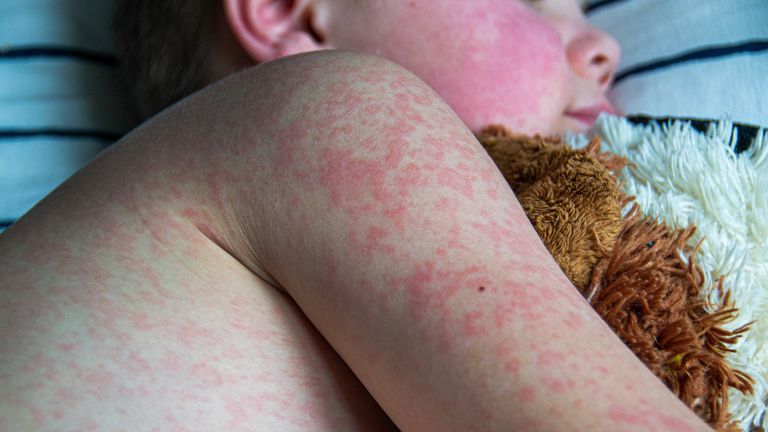Measles cases nearly doubled globally between 2022 and 2023, researchers say.
There were 321,582 cases worldwide in 2023 – an 88% increase from the previous year, when 171,153 cases were recorded.
Total cases for 2024 look on track to at least match last year’s numbers, according to the World Health Organization (WHO).
Some countries could now lose their “elimination status” when it is reviewed in September, the WHO’s Dr Patrick O’Connor warned at the ESCMID Global Congress in Barcelona on Saturday.
The UK was declared measles-free by the WHO in 2017, but had this status stripped from it in 2019 after a surge in cases.
Measures designed to stop the spread of COVID also interrupted measles transmission, and the UK regained its elimination status in 2021.
But England is facing a measles emergency, with almost 900 cases recorded this year – a sharp increase from 368 cases in all of 2023.
Health workers say the current outbreak, which started in the West Midlands last year, has now spread to every region of the country.
The main symptoms of measles are a high fever, sore and red watery eyes, coughing, sneezing and a rash that usually appears after the initial symptoms.
Measles vaccinations in the UK were introduced in 1968 and, until recently, the widespread take-up had all but eradicated the disease. But vaccination rates have been falling.
Dr O’Connor said: “The measles virus is extremely infectious and any gaps in immunisation coverage are potential risk for outbreak. So, coverage needs to high but also uniform and equitable.
“Large outbreak and continuous transmissions of measles are always a concern and can making achieving and maintaining elimination challenging.”
He said the measles vaccination had prevented an estimated 57 million deaths between 2000 and 2022.
The number of countries suffering large or disruptive measles outbreaks – defined as 20 cases per million people continuously over a 12 month period – has tripled from 17 to 51.
The majority of measles cases were in low and lower-middle income countries. The highest rates in the world were in Azerbaijan, Kyrgyzstan and Yemen.
